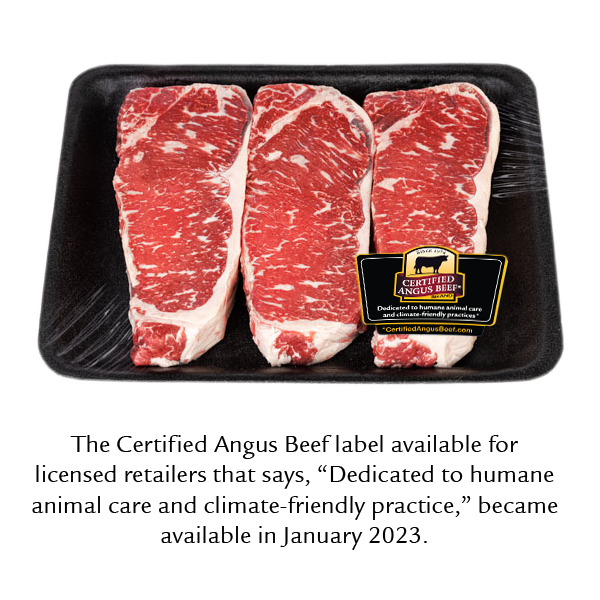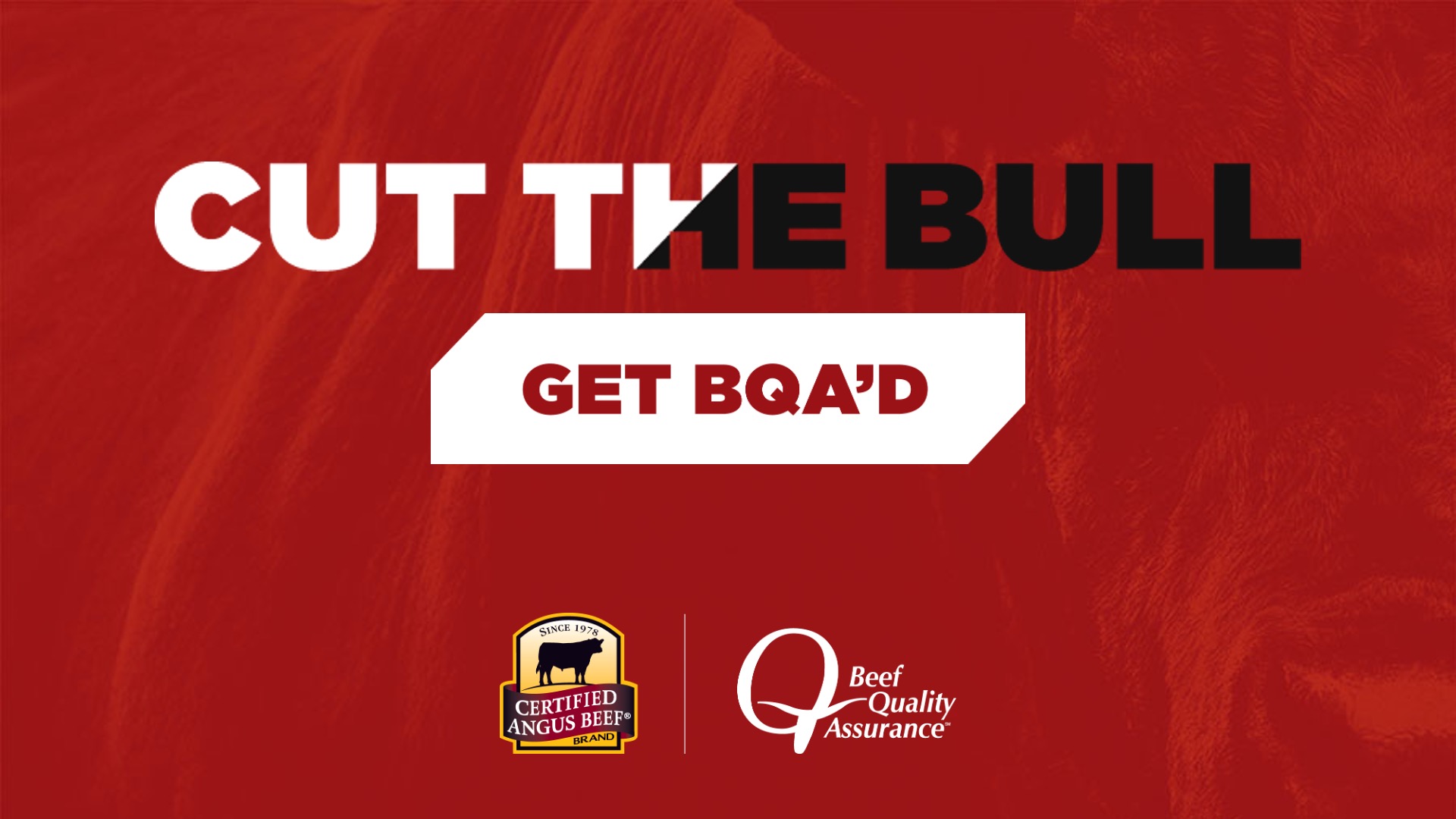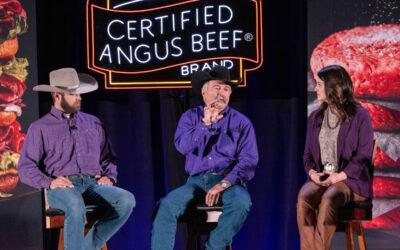
Growing Marketability
Certified Angus Beef works to communicate the great work cattlemen do in the meat case as consumer interest in food sourcing grows.
by Nicole Erceg
December 2022
Whether it’s a champion banner, a record-breaking sale or simply a great reputation, being the best takes more. It requires more information, meeting high standards consistently and necessitates evolution.
Advertised as the “Best Angus Beef” and “If it’s not Certified, it’s not the Best,” Certified Angus Beef’s (CAB) reputation claims elite category status. To remain in that position, the brand must continue to deliver on that promise as customer expectations of quality evolve.
Flavor to the consumer is like sound structure to the cowman. If the animal can’t walk, it can’t work — if the steak won’t eat well, then it’s not worth the cost.
“Delivering on the promise of great-tasting, well-marbled beef is always going to be a requirement,” says John Stika, CAB president. “As we’ve made cattle carcass quality better and the product more consistent, there’s now a generation of consumers who don’t remember a strong variability in flavor and performance. To them, great taste is table steaks. For a premium beef product, it must have flavor and a feel-good factor.”
It’s taste and more.
In 2023 consumers will see a subtle change in packaging and marketing of the brand. The statement “Dedicated to Humane Animal Care and Climate-Friendly Practices” will appear on point-of-sale materials marketing Certified Angus Beef ® brand product.
Of the 51% of consumers who have concerns about beef production, their greatest concern is animal welfare, compared to concerns about environmental impacts, antibiotic use, or hormones (Consumer Beef Tracker, Jan-Dec 2021).
“We wanted to make sure to address their top concern and at the same time combat any notion that our product is bad for the planet,” says Tracey Erickson, CAB executive vice president of marketing. “We research tested several marketing claims to learn what helped elevate the feel-good factor of the brand and this statement rose to the top.”
Expanded marketability is only possible with more information about the supply chain, quantifying the work cattlemen are doing to better the land and care for livestock.
“Just like in marketing bulls, the more data we have about our product and how it was raised, the better we can market that product to a variety of customers who have different desires and needs,” Stika says.

Building Trust through BQA
Animal welfare is a general term that encompasses a multitude of management practices, and that’s challenging to standardize. Beef Quality Assurance (BQA) is a simple, but effective tool that easily communicates cattle that supply CAB are well cared for. According to research from the National Cattlemen’s Beef Association (NCBA) (on behalf of the Beef Checkoff), 70% of consumers agreed that certification increased their confidence that the beef they eat is safe and 67% agreed that it increased their confidence that cattle are humanely raised. Prior to learning about the program, 44% of consumers had positive perceptions about cattle production and that increased to 70% after learning of BQA training.
Leveraging BQA (and equivalent programs) as a tool for truth, when Angus seedstock producers and commercial cattlemen share BQA certification with CAB, it allows the brand to cut through the noise and market the brand as dedicated to humane animal care with the data to back it up.
Cattlemen can learn more and share their certification at CutTheBull.info.

Quantifying Environmental Outcomes
Supporting the “climate-friendly” part of the new marketing claim is the Working Grasslands Conservation Initiative created by CAB and Ducks Unlimited. By supporting a voluntary suite of programs for producers in the Northern Great Plains, CAB is gathering data that shows raising cattle have positive ecosystem benefits. Measuring carbon sequestration, soil health improvements, clean water resource development and biodiversity contributions allows the brand to showcase how raising premium beef has benefits beyond a great steak. Data for the first year of the program is currently being collected.
“We know taking good care of the land is part of raising high-quality cattle,” Stika says. “However, it’s challenging to quantify and measure across an entire industry with a variety of environments. This initiative connects us with environmental scientists doing this work to make voluntary cost share programs accessible to producers and use the data collected to share how beef production has a positive relationship with nature.”
Creating Connection
While taste continues to drive demand and the importance of marbling hasn’t waned, data is an important marketing tool for today’s premium beef customer.
“At the end of the day, this brand is about connecting people and creating value,” Stika says. “By creating a product that people want with the information they are looking for, we can help build trust with our customers and secure future demand.”
This story was originally published the December 2022 Angus Journal.
You May Also Like…
Gardiners Highlight Service, Strength at Foodservice Leaders Summit
Mark Gardiner and his son, Cole, of Gardiner Angus Ranch offered a boots-on-the-ground perspective for CAB specialists attending the annual event, designed to deliver resources that help train foodservice teams and serve consumers at a higher level.
Raised with Respect™ Rewards Producers with Current BQA Certificates
Taking care of your herd is part of the job of every stockman, and it’s the right thing to do. While you’re not committed to cattle care for recognition, you could be rewarded for holding a current BQA certification. Through two incentive opportunities, CAB and Sysco are recognizing producers who go above and beyond to show commitment to their herd.
Chef Coats and Cowboy Hats
Two worlds collide, with one focused on raising the best beef and the other crafting dishes that honor it. This innovative program unites students from Johnson & Wales University and ranchers from across the United States, offering an immersive look at the beef industry.



